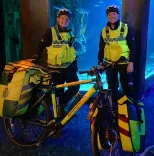Cycle paramedics on-call to keep people safe over the bank holidays
Date: 2 May 2024Over bank holidays in Norfolk, when the population surges, the demand for emergency services increases.

During these busy times, medical incidents often occur in Great Yarmouth's pedestrian areas and beaches. EEAST’s dedicated cycle response team ensures the safety and wellbeing of residents and visitors alike.
Cycle response units can respond to a wide range of calls, from the most seriously ill patients to minor incidents. Cycle paramedics carry defibrillators and virtually all the other equipment found in ambulance paramedics’ bags.
They can assess patients and decide whether hospital transport is necessary, or if patients are safe to discharge.
Martha Davies and Donna Pearson, Paramedics, patrol Great Yarmouth and they are bracing themselves for busy bank holiday weekends during May.
Cycling enables them to navigate through traffic and crowds efficiently, providing prompt assistance.
“The population can easily double – everybody seems to flock to Great Yarmouth,” said Donna.
“This can cause congestion with the one-way system, and that’s where being on a cycle is helpful: we can cut through the traffic and crowds, using back lanes and pathways to get to patients quickly.”
Martha said their visibility also prompts people to approach them with health-related queries, potentially reducing pressure on emergency call centres.
This is part of the log from just one shift with the Great Yarmouth team:
- First on scene to a five-year-old girl with blue lips and stiffness in the joints. Assessment indicates a non-life-threatening but febrile state with a history of previous infection. Patient and parents were conveyed to hospital.
- Called to reports of a 28-year-old woman with an overdose. Found patient outside a beachfront cafe (accessible by foot and bicycle not vehicle). Assessment established that the patient had not taken an overdose but had a learning disability and social issues. The learning disability enhanced support team were contacted, and the patient was walked back to her address to ensure she was safe. No ambulance required.
- A 24-year-old man with severe mouth pain was the next call. Patient was advised to contact 111 for referral to an emergency dentist and prescription of alternative pain relief. Discharged on scene.
- First medic on-scene responding to reports of a 26-year-old female in cardiac arrest. The crew was able to quickly establish that the patient was not in cardiac arrest, but still seriously ill. The cycle response unit assisted an ambulance crew in extricating the patient from an upstairs flat for rapid transport to hospital with police escort.
